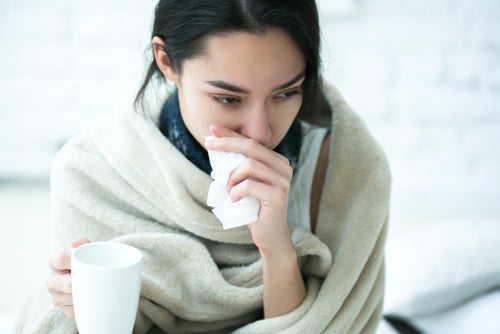You may have heard different pieces of advice about preventing sickness during the flu season. The bottom line is that anybody is at risk for the flu, regardless of whether you’ve received a flu shot. Taking proper prevention measures helps lower your risk of getting sick this flu season. To reach ultimate health and ward off sickness, keep your immune system at its strongest.

 There are numerous ways to boost your body’s immune system naturally, including:
There are numerous ways to boost your body’s immune system naturally, including:
Flu Statistics from the CDC
The Centers for Disease Control and Prevention (CDC) encourage all adults and children over six months of age to receive a flu vaccination to reduce the risk of getting sick. However, getting a flu vaccine isn’t a guarantee you’ll avoid contracting the flu. The CDC provides the following statistics related to the flu:- Flu season often takes place between the months of October through May, and it peaks in the United States between December and February.
- While difficult to determine, the CDC estimates that 9.3 to 49 million people in the U.S. each year get sick from the flu.
- Flu causes 140,000 to 960,000 hospitalizations each year in the U.S., based on CDC estimates.
- The CDC estimates that 12,000 to 79,000 U.S. adults and 37 to 1,200 U.S. children die each year from the flu.
What Are the Symptoms of Flu?
Flu symptoms range from mild to severe, but you may notice the following after contracting the flu virus:- Sore throat
- Fever or chills
- Muscle or body aches
- Fatigue
- Headaches
- Cough
- Runny or stuffy nose
- Vomiting
- Diarrhea
How Is the Flu Spread?
You contract the flu from other people who are infected with the virus. Individuals infected with the flu can spread it to other people who are up to six feet away. The virus is often passed through fluid droplets spread by:- Talking
- Sneezing
- Coughing
- Touching the same surfaces
- Foods prepared by an infected person

Which Flu Prevention Measures Should I Take?
The CDC recommends getting the flu vaccine to lower your chance of getting the flu or developing severe symptoms. The CDC reports that vaccinated adults admitted to the hospital with flu were 59% less likely to suffer severe illness resulting in ICU admission—and vaccinated adults spent four fewer days in the hospital compared with non-vaccinated adults. However, the flu vaccine comes with risks, and not everybody is willing to trust or receive the vaccine. If this is the case for you, do the following to lower your risk of contracting the flu virus:- Wash your hands regularly, rubbing for 15-30 seconds in soapy suds before rinsing.
- Avoid putting your hands on or near your face.
- Keep your distance from people who are sick.
- Wear a mask when you’re in public.
- Boost your immune system.
 There are numerous ways to boost your body’s immune system naturally, including:
There are numerous ways to boost your body’s immune system naturally, including:
- Get at least seven hours of sleep each night.
- Avoid smoking and other tobacco products.
- Eat a plant-based diet rich in fruits and vegetables, such as the Hallelujah Diet.
- Get regular exercise but avoid overtraining.
- Maintain a healthy weight.
- Avoid alcohol or drink it in moderation.
- Minimize stress.
- Take immune-boosting dietary supplements.








